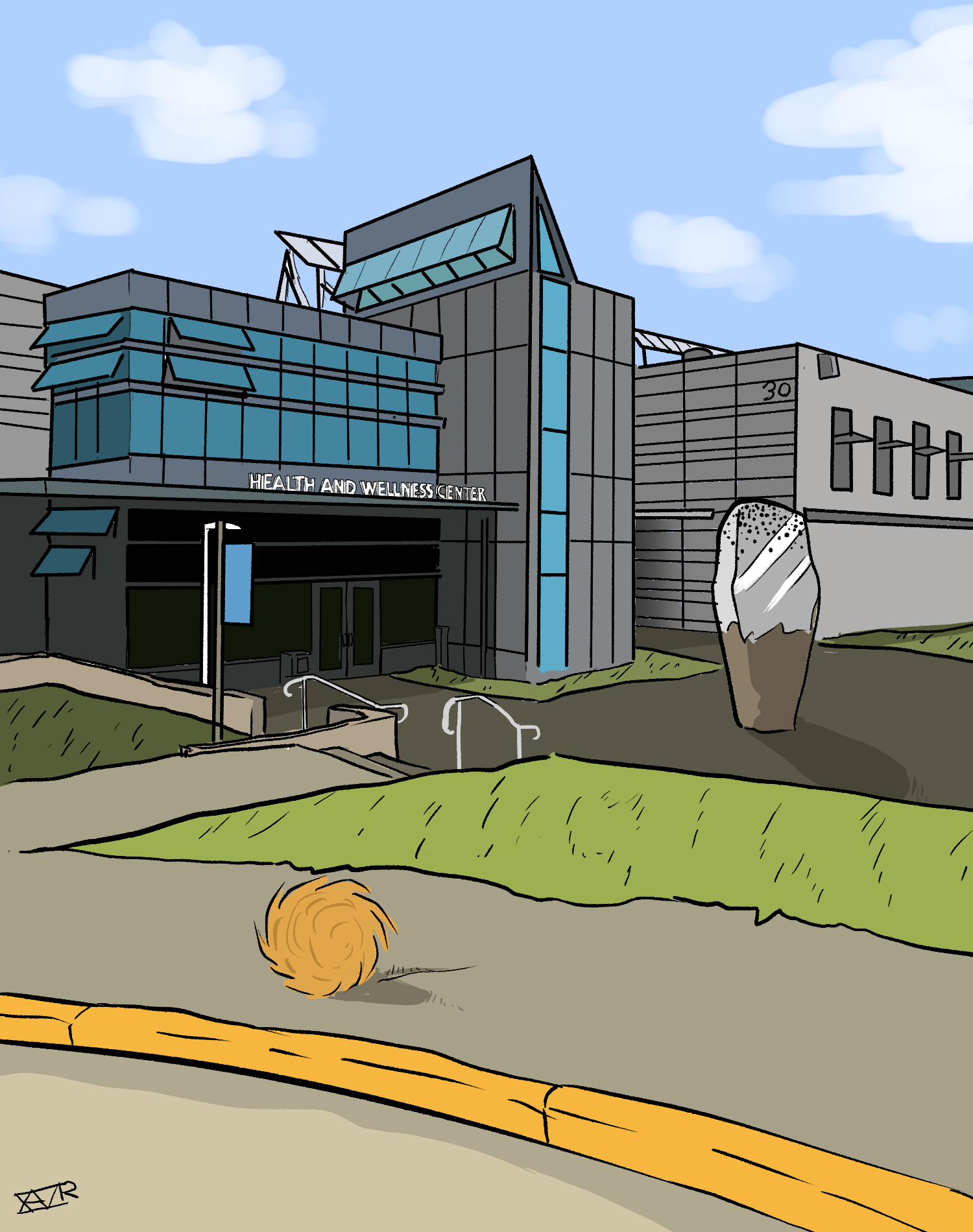How the outbreak affects the economy of students’ educational needs and increases productivity at LCC
As the outbreak tests the limits of the economy and educational system, Lane Community College has responded by making classes available online and laying off staff. The Torch interviewed economist and LCC instructor, Kirk Donavin, to better understand how the current economic crisis is devolving into another financial recession in which students’ needs are being affected.
Donavin has taught at LCC since 2005 and, also, worked at Oregon State University as an accounting supervisor.
He served in the United States Navy for 24 years as an intelligence officer, which he jokingly refers to as “an oxymoron.” Trained as a satellite tasker, he monitored spy satellites circling the earth. After retiring as a chief intelligence officer, he remained in active duty until he retired from teaching full time. He’s been to every continent, except Antarctica.
When it comes to economists accurately predicting a timeline for economic recovery, Donavin said, “We’re good at projecting things, but most economists don’t really know.”
“This is really unprecedented. The so-called Spanish Flu occurred during the First World War, thus, we really don’t know its total effects.” So what’s the difference?
The Federal Reserve, created in 1913 by a secretive group of influential bankers, can regulate inflation with more sophistication. “So long as Congress increases the budget ceiling, the treasury department can go on budgeting as long as they want.” If the Federal Reserve noticed inflation, “they would likely not let the money supply increase because it would drive up interest rates, which slow down the economy and increase the cost of borrowing.”
“We don’t expect to see any inflation from this pandemic.”
Another favorable aspect of the current dilemma, said Donavin, “is when you compare our national debt with most of the major industrial countries, excluding Germany post 1920s, we’re in pretty good shape.” Interest rates on treasury bonds are “pretty low because most people in the rest of the world look for safety and want a US bond,” which is why one third of US national debt is sold to foreign countries, “which has to be paid back with goods and services.”
If foreign countries start becoming scared of the US credit system, “they’d start selling their bonds. And when you sell a bond, the price falls, which increases the yield and drives up interest rates. Then, they’d borrow more money and buy more bonds because of increased interest rates on their investments and reinvest those dividends in more US bonds. “That’s why the United States gets away with running a $50 billion per month trade deficit,” which is “essentially 50 billion dollars per month reinvested in the US economy.”
Two weeks ago, six million Americans filed for unemployment in one week, according to US Treasury statistics, “which is really phenomenal because the highest before that was 800 thousand in late 2008; and, in 2009 it was typically running about half a million per week. Last December, first time unemployment claims were filed at about 200 thousand per week, which is pretty normal, so to get six million in a week is truly something.”
Gross domestic product is measured quarter by quarter; two consecutive financial quarters of falling GDP define an economic recession. We are currently in the second quarter, which means there is slightly less than three quarters between now and 2021. Trump’s prophecy of a market “V bounce” is vanishing into a distant mirage.
“I’d be surprised if next fall we’d be back to normal, hopefully by the first quarter of 2021, but it will take time. It’s not going to just snap back and be the same as always… then again, I’d guess the Ducks win next year too.”
There’s no algorithmic oracle to consult.
“People have to go back out and start traveling and get hired. If you own a restaurant or a shop on the coast you’re not likely to hire your full staff back until you see what happens.” Local hospitality industries are amongst the hardest hit, and some have altered business practices to accommodate and keep doors open.
The service economy not only consists of waiters and baristas, but also “computer programmers, medical staff, teachers, psychologists… it also allows us to have baseball, football, and other things that aren’t so productive.”
Here is a representation of the amount of workers per industry in America. Oxford defines the service industry as “a business that does work for a customer, and occasionally provides goods, but is not involved in manufacturing.”
Knowing when the viral outbreak peaks, and when it falls, is essential to modeling an accurate prediction. There is not yet sufficiently reliable data on the temporal aspects of the global outbreak to feed into an economic model to create an accurate timeline, according to Donavin.
“Overall, it’s not positive for anyone to get coronavirus,” but “recessions for a market are in some ways good, in that they clean up and cause people to be more efficient. Unfortunately unemployment goes up, worker productivity begins to rise because there’s fewer workers. The economy never goes straight up, the market never does. Recessions are self-cleaning and get rid of some of the industries or businesses.”
It’s too early to say exactly how individual departments at LCC will be affected long term.
“We’ve found over the years that when the economy is not doing well, that’s when people tend to want to take a class in economics.” Employment prospects look good from this perspective. “It happened in 2009. It happened back in the 1970s a couple of times when we had the gas shortages.”
Where there is market imbalance, there is opportunity as the market rebalances itself by birthing new industries and ridding itself of others. “The stock price of Zoom,” for instance, “has recently skyrocketed. You wish you happened to buy it months ago.”
“Education will change in the future, and there will be larger classes. But on the other hand, the fact that education increases productivity – and there is a movement in the United States to get people college degrees – you can bring the cost of college down, then you would expect to see more students and, therefore, a case where productivity increases employment for instructors. ”
Increasing student enrollment capacity in courses creates more jobs and simultaneously avoids diminishing demand for teachers.
Donavin said, “That’s an old one we hear all the time: ‘Technology is getting rid of labor and someday there’ll be only just machines.’ But keep in mind, productivity has created far more jobs than it’s destroyed. Those ones that get destroyed are low productivity jobs.”
About 30 years ago, a US economist was assisting a Southeast Asian country with a highway project, Donavin uses this event as an analogy, and said, the economist asked the governor, “Where are your tractors and shovels and scrapers and heavy machinery?” The governor responded, “Well, your excellency, we don’t use those, we want to create jobs.” The economist replied, “Then give them all spoons.”
“The logic of the analogy is that if technology destroys jobs, why not go back and let’s become even less productive and see what happens.”
LCC has to continue paying full-time faculty, and part-time faculty are offered whatever remains. Economics will have one full time instructor teaching four classes, and one part-time instructor teaching two classes, said Donavin. There are now 1.5 instructors teaching economics, compared to the 2.5 instructors teaching 10 years ago (which corresponds with the 2009 recession).
“Thanks to technology, so much of our work can be done at home,” said Donavin. “Grades are done online and transcripts are filed electronically. I don’t think higher education is going to get hurt as much as other sectors.”
As instructors are being forced to use online resources to conduct courses, cancelled classes due to inclement weather can be kissed goodbye. Referencing the snowstorm that hit Lane County a year ago, “With this technology we’re implementing, classes could still be going on.” Campus could be closed for a week and instructors would not have to omit lesson plans to readjust for a shortened quarter – thus, increasing productivity, albeit slightly too efficiently in this case.
Now that big tech companies are investing in the urgent demands of a destabilized educational system, please stop to consider: Will their long term investments benefit students, or serve as malware? The human experience between teacher and student, when mediated by human-computer interaction, may prove to be as disconnected as a landline.



